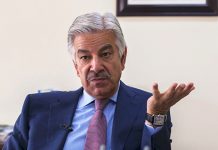
The Pakistan Democratic Movement (PDM) Thursday filed a reference with the Election Commission of Pakistan (ECP) for disqualification of PTI Chairman Imran Khan.
The petition contends that the former premier did not declare the gifts received from the Toshakhana in his assets declaration and therefore should be disqualified under article 62(1)(f) of the Constitution – the same provision under which former prime minister Nawaz Sharif was disqualified in 2017.
Pakistan Muslim League-Nawaz (PML-N) leader and Member of National Assembly (MNA) Mohsin Shahnawaz Ranjha submitted the reference to the ECP. Meanwhile, NA Speaker Raja Pervaiz Ashraf is also expected to send the Toshakhana reference against Imran to the Election Commission on Friday (today). The ruling coalition is apparently in no mood to initiate a barrage of legal proceedings against the PTI after the ECP’s damning report in the prohibited funding case – including preparing for the possibility of launching “operation clean sweep” against the party.
Assisted by the top legal hawks, the coalition government is trying its best to milk the constitutional provisions to corner the arch-rival. The decision to take legal action against the PTI had been taken in a meeting of the PDM chaired by Prime Minister Shehbaz Sharif at the PM House in Islamabad on Wednesday.
The representatives of other allied parties had also attended the meeting which discussed various political matters and the current scenario in the country. The reference demanded the ECP to disqualify Imran under Sections 2 and 3 of Article 63 of the Constitution, read with Article 62(1)(f). It also carried documentary evidence to corroborate their claims against the ex-PM. Article 62(1)(f) says: “A person shall not be qualified to be elected or chosen as a member of Majlis-e-Shoora (Parliament) unless […] he is sagacious, righteous and non-profligate, honest and ameen, there being no declaration to the contrary by a court of law.”
Article 63(2) says: “If any question arises whether a member of Majlis-e-Shoora (Parliament) has become disqualified from being a member, the Speaker or, as the case may be, the Chairman shall, unless he decides that no such question has arisen, refer the question to the Election Commission within thirty days and should he fail to do so within the aforesaid period it shall be deemed to have been referred to the Election Commission.” While, Article 63(3) reads: “The Election Commission shall decide the question within ninety days from its receipt or deemed to have been received and if it is of the opinion that the member has become disqualified, he shall cease to be a member and his seat shall become vacant.” It is pertinent to mention here that the PTI had on Wednesday moved a reference before the Supreme Judicial Council against CEC Raja on Wednesday. The prohibited funding case The prohibited funding case – previously referred to as the foreign funding case – was filed by PTI founding member Akbar S. Babar and has been pending since November 14, 2014. Babar, who is no longer associated with PTI, had alleged serious financial irregularities in the party’s funding from Pakistan and abroad. The PTI has, however, denied any wrongdoing and maintains the funding is not from prohibited sources. In March 2018, a scrutiny committee was constituted to examine the PTI’s financing. The committee submitted its report on January 4, after 95 hearings and nearly four years. The report, based on eight volumes of record requisitioned through the State Bank of Pakistan, proved that the PTI leadership had committed gross violations of funding laws by allowing the collection of millions of dollars and billions of rupees without any source and details from foreigners, including Indian nationals and foreign companies.